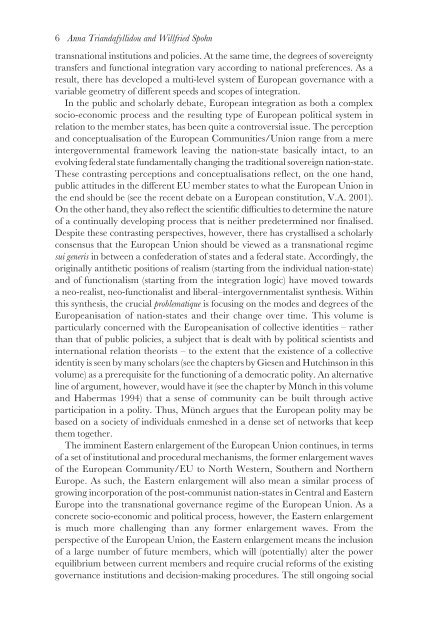Europeanisation, National Identities and Migration ... - europeanization
Europeanisation, National Identities and Migration ... - europeanization
Europeanisation, National Identities and Migration ... - europeanization
Create successful ePaper yourself
Turn your PDF publications into a flip-book with our unique Google optimized e-Paper software.
6 Anna Tri<strong>and</strong>afyllidou <strong>and</strong> Willfried Spohn<br />
transnational institutions <strong>and</strong> policies. At the same time, the degrees of sovereignty<br />
transfers <strong>and</strong> functional integration vary according to national preferences. As a<br />
result, there has developed a multi-level system of European governance with a<br />
variable geometry of different speeds <strong>and</strong> scopes of integration.<br />
In the public <strong>and</strong> scholarly debate, European integration as both a complex<br />
socio-economic process <strong>and</strong> the resulting type of European political system in<br />
relation to the member states, has been quite a controversial issue. The perception<br />
<strong>and</strong> conceptualisation of the European Communities/Union range from a mere<br />
intergovernmental framework leaving the nation-state basically intact, to an<br />
evolving federal state fundamentally changing the traditional sovereign nation-state.<br />
These contrasting perceptions <strong>and</strong> conceptualisations reflect, on the one h<strong>and</strong>,<br />
public attitudes in the different EU member states to what the European Union in<br />
the end should be (see the recent debate on a European constitution, V.A. 2001).<br />
On the other h<strong>and</strong>, they also reflect the scientific difficulties to determine the nature<br />
of a continually developing process that is neither predetermined nor finalised.<br />
Despite these contrasting perspectives, however, there has crystallised a scholarly<br />
consensus that the European Union should be viewed as a transnational regime<br />
sui generis in between a confederation of states <strong>and</strong> a federal state. Accordingly, the<br />
originally antithetic positions of realism (starting from the individual nation-state)<br />
<strong>and</strong> of functionalism (starting from the integration logic) have moved towards<br />
a neo-realist, neo-functionalist <strong>and</strong> liberal–intergovernmentalist synthesis. Within<br />
this synthesis, the crucial problematique is focusing on the modes <strong>and</strong> degrees of the<br />
<strong>Europeanisation</strong> of nation-states <strong>and</strong> their change over time. This volume is<br />
particularly concerned with the <strong>Europeanisation</strong> of collective identities – rather<br />
than that of public policies, a subject that is dealt with by political scientists <strong>and</strong><br />
international relation theorists – to the extent that the existence of a collective<br />
identity is seen by many scholars (see the chapters by Giesen <strong>and</strong> Hutchinson in this<br />
volume) as a prerequisite for the functioning of a democratic polity. An alternative<br />
line of argument, however, would have it (see the chapter by Münch in this volume<br />
<strong>and</strong> Habermas 1994) that a sense of community can be built through active<br />
participation in a polity. Thus, Münch argues that the European polity may be<br />
based on a society of individuals enmeshed in a dense set of networks that keep<br />
them together.<br />
The imminent Eastern enlargement of the European Union continues, in terms<br />
of a set of institutional <strong>and</strong> procedural mechanisms, the former enlargement waves<br />
of the European Community/EU to North Western, Southern <strong>and</strong> Northern<br />
Europe. As such, the Eastern enlargement will also mean a similar process of<br />
growing incorporation of the post-communist nation-states in Central <strong>and</strong> Eastern<br />
Europe into the transnational governance regime of the European Union. As a<br />
concrete socio-economic <strong>and</strong> political process, however, the Eastern enlargement<br />
is much more challenging than any former enlargement waves. From the<br />
perspective of the European Union, the Eastern enlargement means the inclusion<br />
of a large number of future members, which will (potentially) alter the power<br />
equilibrium between current members <strong>and</strong> require crucial reforms of the existing<br />
governance institutions <strong>and</strong> decision-making procedures. The still ongoing social



